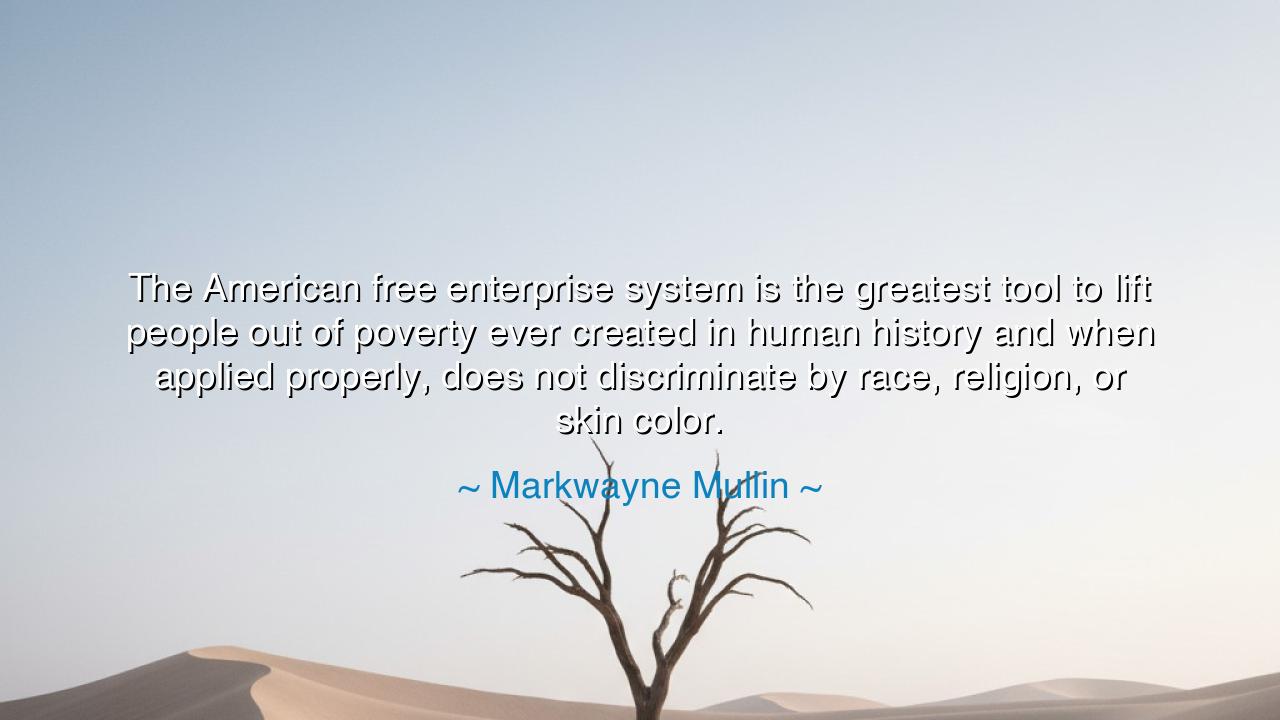
The American free enterprise system is the greatest tool to lift
The American free enterprise system is the greatest tool to lift people out of poverty ever created in human history and when applied properly, does not discriminate by race, religion, or skin color.






The words of Markwayne Mullin—“The American free enterprise system is the greatest tool to lift people out of poverty ever created in human history and when applied properly, does not discriminate by race, religion, or skin color.”—resound with the conviction of one who sees in economic freedom not merely a system of commerce, but a force of transformation. They remind us that free enterprise, at its best, is not about greed or selfish gain, but about opportunity, innovation, and the chance for individuals to rise beyond the station of their birth. It is spoken with the belief that liberty in the marketplace, like liberty in the soul, has the power to break chains and create prosperity where once there was despair.
The origin of such a statement lies in the American experiment itself, a nation founded not upon the strict inheritance of status but upon the vision of opportunity. In the old kingdoms of Europe, birth often dictated destiny, and class barred advancement. But in America, where the soil was fresh and the institutions untested, there grew an idea: that the dignity of work and the spark of ambition could lift even the poor man into wealth. Mullin’s words reflect this heritage, echoing the stories of immigrants and pioneers who arrived with little more than hope, and through toil and ingenuity carved lives of substance and honor.
History offers many witnesses to this truth. Consider the story of Andrew Carnegie, a boy born in Scotland to a family of poverty, who arrived in America with nothing. Beginning as a bobbin boy in a factory, he labored for pennies. Yet through the opportunities offered by the free market—through effort, intelligence, and enterprise—he rose to become one of the richest men of his age. More than that, he turned his fortune to philanthropy, building libraries and institutions to elevate others. His life demonstrates Mullin’s conviction: that when free enterprise is properly applied, it lifts not only individuals but entire generations.
Yet the quote does not ignore the shadow that often lingers where ideals meet reality. Mullin emphasizes that “when applied properly” this system does not discriminate. This phrase is key, for while free enterprise holds the potential to transcend race, religion, or color, history has shown that men’s prejudices can distort even the fairest systems. Laws and practices that excluded people of color or immigrants from equal opportunity often marred the promise of liberty. Thus, his statement is both a declaration of faith in the system and a challenge to ensure its integrity. The system itself may be impartial, but those who wield it must guard against corruption and injustice.
The heart of Mullin’s words is not merely economic but deeply moral. To call free enterprise the greatest tool to lift people out of poverty is to remind us that wealth is not meant only for accumulation, but for empowerment. Commerce, when rightly ordered, becomes not an idol but a servant of humanity. It enables parents to feed their children, communities to thrive, and nations to flourish. Properly applied, it is the harnessing of human creativity, the unleashing of ambition, and the honoring of dignity through labor.
The lesson for us, then, is both inspiring and practical: embrace the spirit of enterprise, but do so with justice. Seek opportunity, yes, but also create it for others. Do not close doors through prejudice or greed, but open them so that every man and woman—regardless of race, religion, or skin color—may walk the path of prosperity. For the true greatness of free enterprise lies not in the wealth of a few, but in the lifting of the many.
Practically, this means supporting systems that encourage innovation and hard work while ensuring fairness. It means refusing to exploit, but instead building businesses and communities that uplift. It means honoring the dignity of labor, seeing in every worker not just a tool for profit but a human soul striving for a better life. And for each of us, it means cultivating a spirit of perseverance, knowing that while life may not be equal in beginning, the opportunities we seize and create can shape its end.
Thus, Mullin’s words echo as both celebration and challenge: the American free enterprise system, when wielded with integrity, is not merely a machine of wealth, but a force of justice, dignity, and uplift. It is a tool of liberation, not bound by color or creed, but by the strength of character and the courage to act. Let us then apply it rightly, that generations to come may say not only that it created prosperity, but that it honored the humanity of all.






AAdministratorAdministrator
Welcome, honored guests. Please leave a comment, we will respond soon